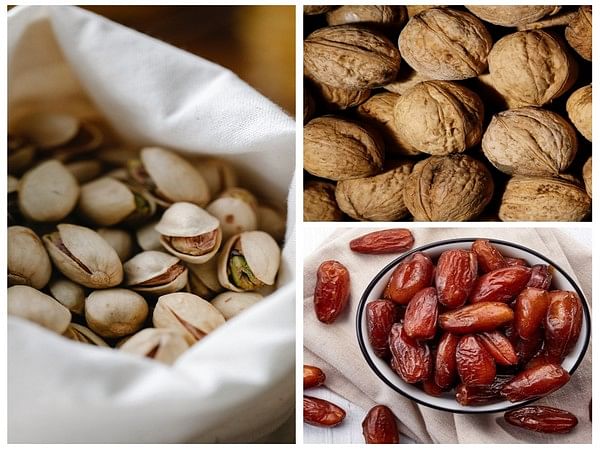New Delhi [India], January 10 (ANI): The next phase of winter is here! And as it gets chillier by the day, prepare to fight it with nutritious winter superfoods. Yes, we’re talking about ‘dry fruits’ which are a staple in India.
They are typically consumed during the winter since they can keep you warm and boost your immunity against frequent winter illnesses. Energy, protein, vitamins, and other vital nutrients are all provided by dry fruits for your body.
Due to similar benefits, several nuts are called dry fruits. It is advised to include a portion of dry fruit in each meal if you want to lose weight because they are a better alternative to fried foods. These nutrient-rich dried fruits have many health benefits, including the ability to fight off infections, boost immunity, and enhance digestion.
They are commonly available in the market and can be eaten raw or cooked. Remember that eating too much dry fruit can lead to problems such as digestive issues, weight gain, and other problems.

1. Raisins (Kishmish)
Raisins are dried grapes rich in nutrients like vitamins and minerals. They are a treat for those who have a sweet taste because they are naturally sweet and high in calories. It facilitates digestion and contains dietary fibre, which lowers harmful cholesterol levels.
Additionally, it contains adequate amounts of iron, calcium, and boron, all of which support bone health and the prevention of osteoporosis. Iron also encourages the creation of red blood cells and prevents anaemia. They include anti-oxidants that aid in protecting against conditions like cancer and heart disease. Due to their high sugar and calorie content, seeded raisins have 122 calories in one-fourth cup, thus it’s important to eat them in moderation. They go well with cereal, yoghurt, cookies, bread, oats, and bread.

2. Dried dates
Dates are a superfood found in most houses in India. Dates contain calcium, magnesium, potassium, iron, and other nutrients that can enhance your health and are eaten raw or used in sweets. Polyphenols found in dried dates can help with diabetic management, better digestion, and cancer prevention.
Additionally, they help the body detox and minimise inflammation. It can treat digestive problems and successfully and naturally induce labour, which makes it beneficial for expectant mothers as well. Protein bars often contain dates, which are a nutrient-rich energy source. 125 calories are present in one-fourth cup of chopped dried dates. Despite having a high calorie count, it has a low glycemic index because of its high fibre content. Two to three dates can be eaten while on a diet, which can help you fulfil your sweet appetite.

3. Pistachios (Pista)
India is known for its delicious pistachios. Potassium and healthy fat, abundant in pistachios and have anti-inflammatory and antioxidant effects, are good for your heart. Due to their ability to enhance beneficial gut flora, pistachios are beneficial for gut health.
Additionally, it can increase the proportion of beneficial bacteria to dangerous bacteria, which is good for the health of your heart. They also aid in weight loss since their high protein and fibre content keeps you fuller for longer. Pistachios have 173 calories in a quarter cup, making them a satisfying snack for people on a diet. Since they contain sodium, eat them in moderation. Large salt intakes might be harmful to your health. They are added to desserts, ice cream, and dessert dishes as a dressing.

4. Cashew nuts (Kaju)
Cashews are nutritious nuts with multiple health benefits. They are high in magnesium, copper, and manganese, which support brain function, bone health, and the immune system. It also contains antioxidants, which help to protect against disease.
Cashews may also benefit heart health by increasing good cholesterol and lowering blood pressure. They are also a good source of energy. Cashew is a versatile nut that can be used in a variety of dishes such as soups, salads, and stews. Many traditional Indian sweets, such as Barfi and Laddu, contain cashew nuts. Cashews have 170 calories per quarter cup, making them a low-calorie nut that can aid in weight loss. It’s brilliant as a snack or with salads. However, it is important to note that raw cashews have a high salt and oil content, which can be reduced by roasting them.

5. Almonds (Badaam)
It is a well-known fact that almonds help boost memory. Consuming them in the morning after soaking them all night can improve cognitive performance. They are rich in vitamin E, which helps elderly people’s memories and lowers their risk of developing dementia.
They can also stop the buildup of plaque in your arteries, lowering your risk of developing heart disease. Magnesium is also abundant in almonds, which may aid in controlling your blood sugar levels. They may help people lose weight since they contain fibre, good fats, and protein. There are 162 calories in a quarter cup (23 almonds). Almond milk and flour are multifunctional and can be used in a variety of ways. They can also be added as a garnish to desserts like kheer.

6. Walnuts (Akhrot)
Nutrient-rich walnuts are a delicious and healthy snack. They include a substantial number of antioxidants that improve skin health and lessen the harm caused by poor cholesterol. Walnut’s fatty acids may be good for your heart and help lower your risk of developing heart disease.
They also boost the number of beneficial bacteria in the gut and enhance gut health. Many diseases can be avoided with good gut health. Walnuts benefit your brain by reducing inflammation and promoting brain function because they also include vitamin E and polyunsaturated fats. A quarter cup of walnuts, which are frequently added to salads, desserts, stir-fries, and yoghurt, has roughly 190 calories. Walnuts should be avoided by some people who are allergic to nuts, and if consumed in excess, walnuts can upset the stomach. (ANI)
This report is auto-generated from ANI news service. ThePrint holds no responsibility for its content.



